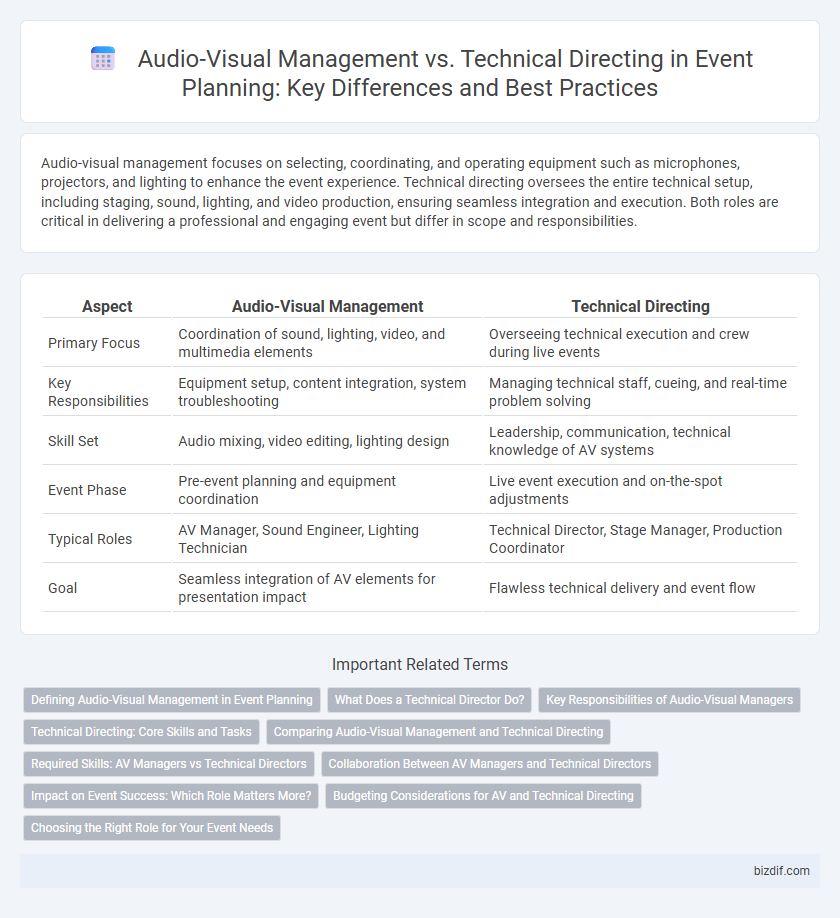Audio-visual management focuses on selecting, coordinating, and operating equipment such as microphones, projectors, and lighting to enhance the event experience. Technical directing oversees the entire technical setup, including staging, sound, lighting, and video production, ensuring seamless integration and execution. Both roles are critical in delivering a professional and engaging event but differ in scope and responsibilities.
Table of Comparison
| Aspect | Audio-Visual Management | Technical Directing |
|---|---|---|
| Primary Focus | Coordination of sound, lighting, video, and multimedia elements | Overseeing technical execution and crew during live events |
| Key Responsibilities | Equipment setup, content integration, system troubleshooting | Managing technical staff, cueing, and real-time problem solving |
| Skill Set | Audio mixing, video editing, lighting design | Leadership, communication, technical knowledge of AV systems |
| Event Phase | Pre-event planning and equipment coordination | Live event execution and on-the-spot adjustments |
| Typical Roles | AV Manager, Sound Engineer, Lighting Technician | Technical Director, Stage Manager, Production Coordinator |
| Goal | Seamless integration of AV elements for presentation impact | Flawless technical delivery and event flow |
Defining Audio-Visual Management in Event Planning
Audio-visual management in event planning involves coordinating sound, video, and lighting systems to ensure seamless multimedia delivery throughout an event. This role encompasses equipment setup, troubleshooting, and the integration of technology to enhance audience engagement and communication. Effective audio-visual management demands technical expertise and collaboration with event planners to meet specific event objectives and maintain high production standards.
What Does a Technical Director Do?
A Technical Director in event planning oversees the integration and execution of all technical aspects, including lighting, sound, and video systems, ensuring seamless production flow. They coordinate with audio-visual teams to manage equipment setup, troubleshoot issues, and maintain quality control throughout the event. Their role bridges the gap between creative vision and technical implementation, guaranteeing a flawless audience experience.
Key Responsibilities of Audio-Visual Managers
Audio-Visual Managers oversee the coordination and operation of audiovisual equipment to ensure high-quality sound, lighting, and video during events. Their key responsibilities include managing technical staff, maintaining and troubleshooting AV gear, and collaborating with event planners to align audiovisual elements with the event's objectives. Effective AV management enhances audience engagement by delivering seamless multimedia experiences and real-time technical support.
Technical Directing: Core Skills and Tasks
Technical directing in event planning centers on managing live production elements, including video switching, camera coordination, and real-time graphics integration. Core skills involve proficiency with broadcast equipment, timing precision, and troubleshooting under pressure to ensure smooth transitions and high-quality output. Mastery in communication and leadership is essential for orchestrating technical teams and adapting quickly to dynamic event environments.
Comparing Audio-Visual Management and Technical Directing
Audio-visual management focuses on coordinating all visual and sound elements to ensure seamless media integration during events, emphasizing equipment setup, signal flow, and content playback. Technical directing involves real-time decision-making and control of live production elements, such as camera switching, cueing videos, and managing live broadcast feeds to deliver a cohesive audience experience. Both roles require technical expertise, but audio-visual management is more pre-event planning and setup, while technical directing is active execution and live event control.
Required Skills: AV Managers vs Technical Directors
Audio-visual managers require strong organizational skills, proficiency with AV equipment setup, and expertise in sound, video, and lighting systems to coordinate seamless event production. Technical directors need in-depth technical knowledge, leadership abilities, and problem-solving skills to oversee real-time video switching, broadcast engineering, and stage control systems. Both roles demand effective communication and teamwork to ensure flawless execution of complex audio-visual designs during live events.
Collaboration Between AV Managers and Technical Directors
Effective collaboration between Audio-Visual (AV) Managers and Technical Directors is crucial for seamless event execution, ensuring all equipment and technical needs align with event goals. AV Managers coordinate the procurement, setup, and maintenance of sound, lighting, and video systems, while Technical Directors oversee live event operations, managing crews and troubleshooting technical issues in real time. Their synergy enhances communication, streamlines workflows, and guarantees a professional, immersive experience for attendees.
Impact on Event Success: Which Role Matters More?
Audio-visual management ensures seamless integration of sound, lighting, and visual elements to create a captivating event atmosphere, directly influencing attendee engagement and satisfaction. Technical directing focuses on coordinating complex technical operations and real-time problem-solving, essential for maintaining event flow and avoiding disruptions. The synergistic impact of both roles is critical, but technical directing often carries greater weight in safeguarding event continuity and success under pressure.
Budgeting Considerations for AV and Technical Directing
Budgeting considerations for audio-visual (AV) management include allocating funds for equipment rentals, software licenses, and skilled technicians to ensure seamless audiovisual experiences. Technical directing budgets prioritize expenses related to live event production, such as video switching, real-time troubleshooting, and coordination of multiple media sources. Effective budget planning balances AV equipment costs with technical directing expertise to deliver high-quality event experiences within financial constraints.
Choosing the Right Role for Your Event Needs
Audio-visual management focuses on coordinating equipment, ensuring seamless sound, lighting, and video integration to enhance the event experience. Technical directing involves overseeing the technical crew, managing live production workflows, and making real-time decisions during the event. Choosing between these roles depends on the event's complexity, scale, and requirement for on-the-spot technical direction versus equipment coordination.
Audio-visual management vs technical directing Infographic

 bizdif.com
bizdif.com